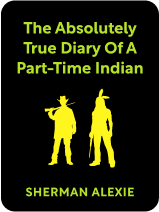

This article is an excerpt from the Shortform summary of "The Absolutely True Diary of a Part-Time Indian" by Sherman Alexie. Shortform has the world's best summaries of books you should be reading.
Like this article? Sign up for a free trial here .
Where is the Spokane Indian Reservation? What does the Spokane Indian Reservation have to do with the book The Absolutely True Diary of a Part-Time Indian?
In The Absolutely True Diary of a Part-Time Indian, the Spokane Indian Reservation is the home of Arnold Spirit Jr., known as Junior. Junior feels a connection to the reservation, but also feels like he has to leave it in order to escape common tragedies like poverty, alcoholism, and early death.
Find out more about Junior’s life on the Spokane Indian Reservation.
Junior’s Life on the Spokane Indian Reservation
14-year-old Junior lives in Wellpinit, Washington, a small town on the Spokane Indian Reservation, known to residents as “the rez.” Junior describes the rez as “located approximately one million miles north of Important and two billion miles west of Happy.” Reservations like Spokane’s were created in the image of death camps. Junior speculates that the government hoped Indians would go there, die out, and disappear. But the Spokane tribe didn’t disappear, and now tribe members stay of their own free will. They’re born on the rez and they die on the rez. No one ever leaves.
The rez is characterized by the poverty and alcoholism of its residents. But the rez is also an extended family—everyone knows each other and comes together in times of need.
This doesn’t mean that life on the rez is always peaceful. As happens in communities where everyone knows everyone else’s business, disagreements are frequent, and there are unofficial rules for handling conflict and defending your honor.
Spokane Rules of Fisticuffs
1. You have to fight anyone who insults you.
2. You have to fight anyone you think is going to insult you.
3. You have to fight anyone you think is thinking about insulting you.
4. You have to fight anyone who insults your family, anyone you think is going to insult your family, or anyone you think is thinking about insulting your family.
5. You shouldn’t fight a girl unless she insults you or someone in your family.
6. If an adult beats up your mom or dad, you have to fight that person’s son or daughter.
7. If one of your parents beats someone up, that person’s child has to fight you.
8. You have to fight the kids of people who work for the Bureau of Indian Affairs.
9. You have to fight any white kids who live on the reservation.
10. You have to throw the first punch if you’re in a fight with someone stronger than you. (It’s the only punch you’ll have the chance to throw.)
11. The person who cries first is always the loser.
Back on the rez that evening, Junior collects a little spare change as he goes house to house in his homeless-man costume, and he even gets some encouragement from a few grandmothers who think he’s brave for leaving the reservation to go to a white school. But more often, he gets called names by his neighbors, who slam the door in his face. Many residents of the Spokane Indian Reservation resent Junior for leaving the rez, seeing this as a betrayal of his Indian culture.
The Winter Formal
Junior continues to feel like a stranger no matter where he is: In Wellpinit, he feels half white; in Reardan, he feels half Indian. At school, he doesn’t correct classmates who assume that he’s rich because there’s a casino on the Spokane reservation. He uses the fact that all white people think Indians get free money from the government to hide his poverty.
Junior worries his charade will be exposed when he takes Penelope to the Winter Formal. He knows that his $5 won’t pay for much during the night, but he also knows that if he doesn’t take Penelope to the dance, someone else will. So he decides to wing it.
Because he doesn’t own a suit, Junior wears one of his dad’s polyester, bell-bottomed suits from the 70s. He expects his classmates to make fun of him, but Penelope makes sure to loudly compliment his “retroactive” suit as soon as he walks into the dance, and suddenly, disco is cool at Reardan.
The Wake
Two thousand people attend the wake for Junior’s grandmother, moved to the football field to accommodate them all. None of them taunt Junior. This is a turning point in Junior’s relationship with the members of his community: People on the rez stop ignoring or bullying him. They witness the grief of his family, and in their sympathy, they seem to stop viewing Junior as the enemy.
A white man shows up at the wake. Junior recognizes him as a Spokane billionaire famous for his wealth. The man stands to speak, and everyone’s excited to hear how this white billionaire knew Grandmother Spirit. They’re all disappointed when he starts talking about how much he loves Indians. Too many white people come to the reservation to tell the people living there how much they love them. It’s patronizing, and it’s boring. What’s worse, this man is a collector. White people collecting Indian art and artifacts makes the Spokane “feel like insects pinned to a display board.” The thousands of Indians at the wake become uncomfortable as Ted the billionaire talks about his collection.
Ted tells the group that his collection includes powwow dance outfits. Everyone suddenly wakes up—it’s unusual for powwow outfits to leave the tribe. He says an Indian stranger sold it to him, and even though the billionaire knew that the item was probably stolen, it was so beautiful that he paid the man and kept it for himself. Years later, guilt prompted him to search for the original owner of the outfit. He’s found her: Grandmother Spirit. He asks any children of Grandmother Spirit to step forward so he can return the outfit.
Junior’s mom stands to meet the billionaire. He asks for her forgiveness, but she tells him there’s nothing to forgive—the outfit wasn’t Grandmother Spirit’s. It couldn’t have been. She was never a powwow dancer. In fact, when Junior’s mom looks at the outfit, she doesn’t think it’s Spokane at all. She tells the billionaire that the anthropologist he’d hired to research the outfit didn’t know what he was talking about.
Embarrassed, the billionaire hurries away, taking the outfit with him. For a couple of minutes, everyone at the wake is silent, not knowing what to make of this odd interruption. Then, Junior’s mom starts to laugh. Her laughter is contagious, and soon, all two thousand guests are laughing. They laugh for the rest of the wake, laughing and crying as they bury Grandmother Spirit.
Junior cries for:
- His sister and her premature death
- Himself and the fact that he’s the only one who’s been brave and arrogant enough to leave the rez and find a “better life out in the white world”
- His tribe, many of whom will die in the coming year due to the effects of alcohol
But Junior’s not alone in his grief, or his bravery. He’s in the company of millions of Americans who’ve “left their birthplaces in search of a dream.” He’s a member of the Spokane Indian Reservation tribe, but he’s also a member of many other tribes, including:
- The basketball tribe
- The bookworm tribe
- The cartoonist tribe
- The teenage-boy tribe
- The poverty tribe
- The funeral-goers tribe
- The American immigrants tribe
- The tortilla-chip-lovers tribe
- The boys-who-miss-their-best-friends tribe
Understanding that his world is bigger than the Spokane and that he’s a member of many different tribes, Junior knows that even through his grief, he’s going to be okay. But he also worries about the people he loves who may not be okay, like Rowdy.

———End of Preview———
Like what you just read? Read the rest of the world's best summary of Sherman Alexie's "The Absolutely True Diary of a Part-Time Indian" at Shortform .
Here's what you'll find in our full The Absolutely True Diary of a Part-Time Indian summary :
- How Junior gets split between two worlds when he goes to a mostly white school
- How Junior overcomes being an outsider to being part of welcoming social circles
- The tragedies of alcoholism and poverty that leave Junior with renewed strength






